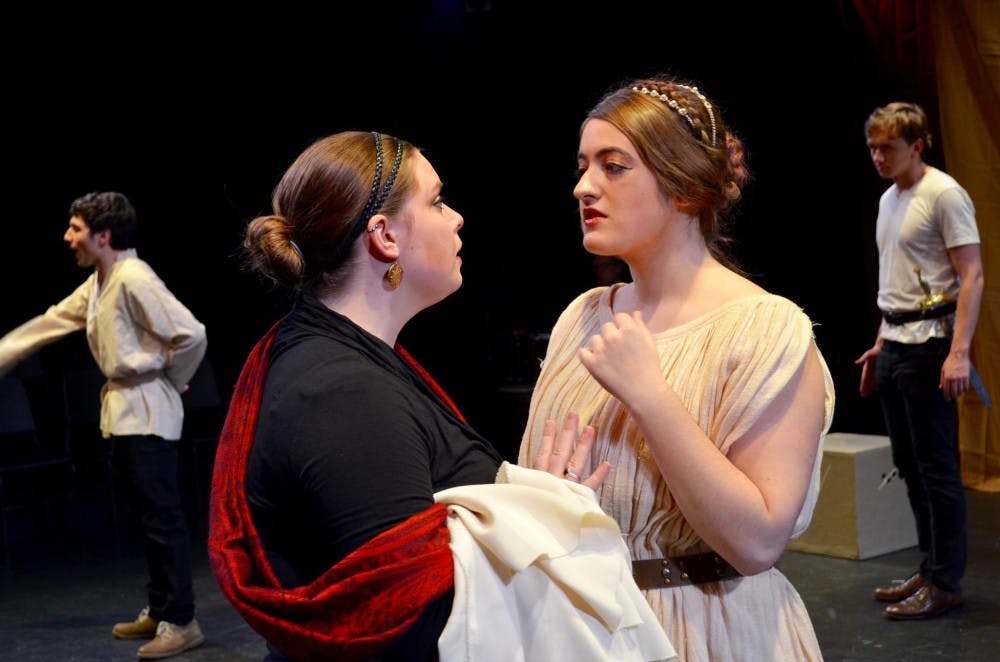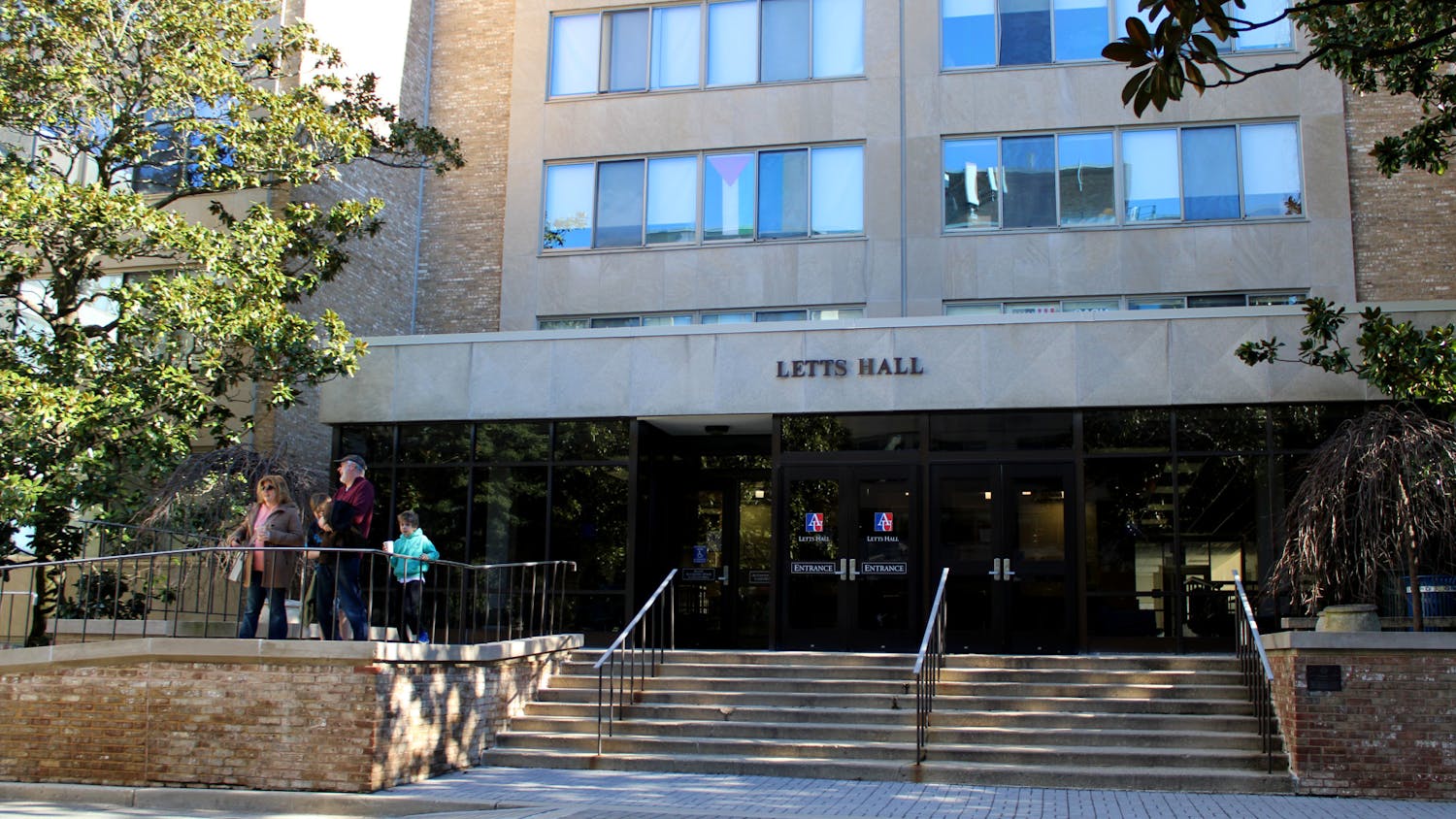The AU Rude Mechanicals presented “The Lamentable Tragedy of Titus Andronicus” on the weekend of March 17-19. “Titus” chronicles the tale of Titus Andronicus, his family and racial tension between the Romans and the Goths. Director Lucette Moran, a senior in the School of International Service, writes in the program that this is Shakespeare’s least eloquent and most blunt piece of theater.
Despite being set in Rome hundreds of years ago, “Titus” addresses the issues of racism, sexism and justice that continue to exist today.
“Titus” begins with the death of the Roman emperor, raising questions about who should fill his place. A Roman official suggests Titus, a war hero who led victorious campaigns against the Goths. Titus doesn’t want the throne and recommends that Saturninus, one of the emperor’s sons, take it instead. Saturninus gladly accepts the throne then attempts to claim Titus’s daughter Lavinia as his wife, but Lavinia is already engaged to Saturninus’s brother Bassianus. Saturninus then chooses instead to marry Tamora, the Queen of the Goths whom Titus captured and whose firstborn son he killed.
By this point in the play, everything seems relatively calm. However, things quickly spiral out of control as Tamora seeks revenge on Titus for the death of her son and teams up with Aaron, her secret lover and the only character in the play who is a Moor, to wreak havoc on Titus’s life.
Catherine Doherty, a sophomore in SIS, gave the most compelling performance in the play as Tamora. She truly embodied Tamora’s conniving and manipulative personality, striking fear into the audience’s hearts as she lurked around the set, pretending to love Saturninus while using her newfound power to plot her revenge on the Romans.
Tamora’s two remaining sons rape Lavinia and cut off her tongue and hands. Two of Titus’s sons are falsely accused of the murder of Bassianus, and Aaron claims that if Titus cuts off his own hand they will be freed. Titus complies and cuts off his hand, but moments later the severed heads of his sons are brought to him. All of these events occur rapid-fire within the first half of the performance, and, as a result of these tragedies, Titus begins to lose his mind.
Moran said the cast held 31 rehearsals over seven and a half weeks starting on January 16, and she estimates around 70 to 80 hours of rehearsal went into this performance. “Titus” is Moran’s honors independent study project, and she is now working on a paper about the major themes in the play including race, sex and violence, and how generations pass on violent and prejudiced discourse.
“Every single character in this play is in some way racist, sexist or otherwise prejudiced and each character behaves and makes decisions wholly unaware of their inherent biases,” Moran said. “Not a single character can escape the power of institutionalized racism or sexism, and it influences most if not all of their choices.”
Lavinia’s rape and the violent loss of her tongue demonstrated the powerlessness of women and their loss of voice in a patriarchal society. As American University comes under fire for how it has dealt with sexual assault cases, Lavinia’s circumstances are surprisingly relevant.
Unlike the Rude Mechanicals’ modern take on Shakespeare’s “As You Like It” last year, Moran chose to keep the period aesthetic but said she encouraged the actors to explore modern interpretations of the text to understand how “Titus,” despite being written hundreds of years ago, eerily echoes many questions and issues we face today.
“All you need to do is follow the news or the presidential primary race to see how ‘Titus’ remains relevant today,” Moran said. “As Trump continues to perpetrate ethno-nationalist rhetoric, and race or gender-based violence continues to permeate our campuses, cities and media, college students need to remain both externally and internally critical.”
During the performance of the show, two of the youngest cast members wowed the audience with their acting and character delivery. Marisa McPherson, a sophomore in the College of Arts and Sciences, gave a sweet and sympathetic portrayal of tragic Lavinia, and Charlie Veraza, a freshman in SIS, gave a strong, uncompromising and hot-headed portrayal of Titus’s son Lucius.
“For me, this was an extremely personal show, as I drew upon my own experiences with assault to bring Lavinia to life,” McPherson said. “It was an incredibly difficult thing to perform simply because it’s hard to separate the character and the emotions sometimes.”
Veraza previously only performed in musicals, rather than plays. He said preparing for this performance was vastly different than preparing for musicals.
“In musicals you act out a character, in Shakespeare you are the character,” Veraza said.
Following the performance on Friday, Moran held a director talk-back where the audience had the opportunity to ask questions about the play. The discussion focused on the themes of justice and sacrifice, racism and prejudice and the lengths one will go to in order to protect his or her family.
“Hopefully, we’ve encouraged our audience to ask, ‘Why are we still asking these same questions? What more can we do to change this?” Lucette said.
amaier@theeagleonline.com





